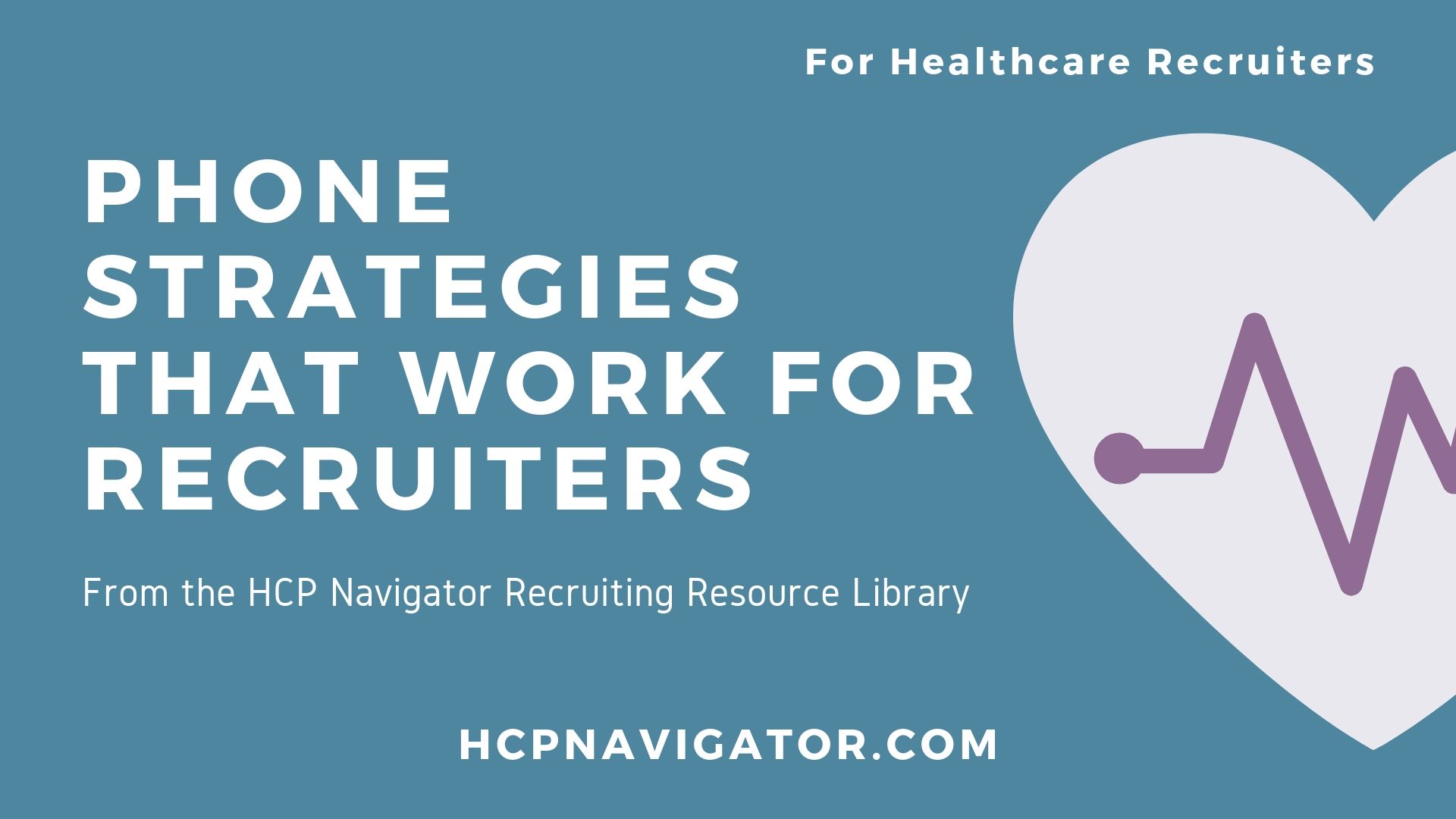
Phone Strategies That Work For Recruiters
Healthcare recruiters spend a lot of time sourcing and finding potential candidates. Once they have reviewed profiles and CVs, they come up with a list of individuals to contact. Most professionals in healthcare recruiting today would rather start by emailing healthcare candidates, but there may be a more efficient and effective way to recruit providers.
EMAIL EFFICACY
As we pointed out in our most recent blog post, the average individual receives over 100 emails daily, while physician candidates may receive dozens of emails with hiring opportunities. Most healthcare candidates will briefly scan the subject lines in their inbox when deciding which emails are worth their time and consideration. According to MailChimp, less than 20% of recruiting and staffing emails are opened. Therefore, there’s a very good chance your email may never be seen.
If a healthcare candidate does open your email but doesn’t like your message, they may simply delete the email. You never get a chance to overcome any of their objections by starting with an email. In addition, of those emails that are opened, less than 2% of readers click through to view the job description or company website.
PHONE CALLS PREFERRED
Instead of emailing, you can set yourself apart from other healthcare recruiters by picking up the phone and calling provider candidates. Although emailing someone is easier and more convenient, a phone call is typically the best way to build a relationship, gather information, and learn about their needs. A live conversation gives you a glimpse into their personality, allows you to convey emotion, and provides you the opportunity to ask questions, listen to their responses, and overcome objections.
Here are 6 things to consider when making your call:
ESTABLISH RAPPORT
Most professionals in healthcare recruiting agree you need to spend the initial few minutes on the phone covering introductory information to ensure the candidate feels like you’re about to reveal a professional opportunity worth their time. Open quickly with the purpose of the call and show some courtesy by asking if now is a suitable time to speak. After you’ve introduced yourself and given a little background about the company and position, start by mentioning the aspects of their resume that make them an attractive candidate. You probably won’t have to search their resume very far to find these details because most physicians have a long list of impressive accomplishments. When warranted, you should refer to them as a “leader” or “expert” in their specialty and mention how some of their specific skills would align well with the job requirements.
GRAB THEIR ATTENTION
After you’ve built rapport, it’s time to grab their attention and pique their curiosity so they’ll want to know more. You could lead with a question like this: “Would you be open to exploring an opportunity if it was substantially better than what you’re currently doing?” Even if they’re not currently looking for a new position, the candidate will be interested in hearing what could possibly be significantly better than their present role.
SELL THE POSITION
It’s important for healthcare recruiters to understand how the current position relates to the individual healthcare candidate’s background. Connecting the dots between the candidate’s current position and future opportunity piques their interest and makes them want to move forward in the process with you. Here are some of the components that can enhance a job’s candidate appeal:
- Supportive management team
- Career growth opportunities
- Geographically desirable
- Fast growing company
- Well-respected brand
- Financial incentives
- Work-life balance
GATHER INFORMATION
After you’ve built rapport, grabbed their attention and sold the position, you’ll want to ask your healthcare candidate some questions to gauge their interest level. Ask them about their goals and healthcare career aspirations. Ask them what motivates or interests them in looking at new opportunities. Finally, ask them for their thoughts about the healthcare position you have presented. This will either give you the opportunity to address their concerns, further build the connection between the candidate’s current position and your opportunity, or realize that this may not be the right fit for this individual.
THANK & NETWORK
First and foremost, take a moment to thank them for their time. People love being thanked. Second, summarize what you heard about their goals and healthcare career aspirations. If this is a good fit for them, discuss next steps. However, it is inevitable that not every candidate may have the skills, experience or interest required for the job in question. Therefore, if this is not a good fit for them personally or professionally, let them know that you will keep their candidate information on file in the event that another opportunity, which is a better fit for them, presents itself. In addition, ask them if they may know of any colleagues who may be a better fit for this opportunity. Every call should be an opportunity to gather information about a prospective candidate along with gaining more connections to contact for current or future opportunities. Be sure to document your findings in an applicant tracking system, like HCP Navigator’s RMS, so you can have a catalog of screened candidates ready when your next opportunity opens up.
FOLLOW UP
One of the biggest complaints from job seekers is that they never hear back from recruiters after the initial call. This leaves a negative impression of the company and the recruiter in the mind of the candidate. They may even inform their colleagues and possibly post on social media about their frustrations. After you’ve had a call with a potential candidate, be sure to follow up with them. Let them know if they are not being considered for an interview, or if they didn’t get the position. This simple step will leave your candidates with a positive impression of their interaction with you and your company. Again, remember to use an applicant tracking system to keep up with candidates you can’t use now because you never know what your next open opportunity will be.
LEARN MORE
Now it is time to apply what you’ve learned. Perhaps you’re a recruiter who is more than willing to pick up the phone but you’re not sure how to start sourcing potential candidates. Experienced recruiters know the easiest and most lasting hires are typically those where the candidate is already pre-disposed to your location. HCP Navigator’s PracticeAlert helps you capitalize on this hard-won knowledge by delivering geographically-focused candidates right to your inbox.
If you prefer to go a more traditional route in sourcing candidates, HealthcareJobFinder is a great way to get your jobs noticed because your basic job listings are 100% complimentary. You can start posting your jobs today.
Of course, the phone is only one tool in most successful healthcare recruiter’s toolkit. Check out the HCP Navigator Recruiting Resource Library for general recruiting best-practices and learn how to Write Recruiting Emails That Work.
Happy recruiting!



